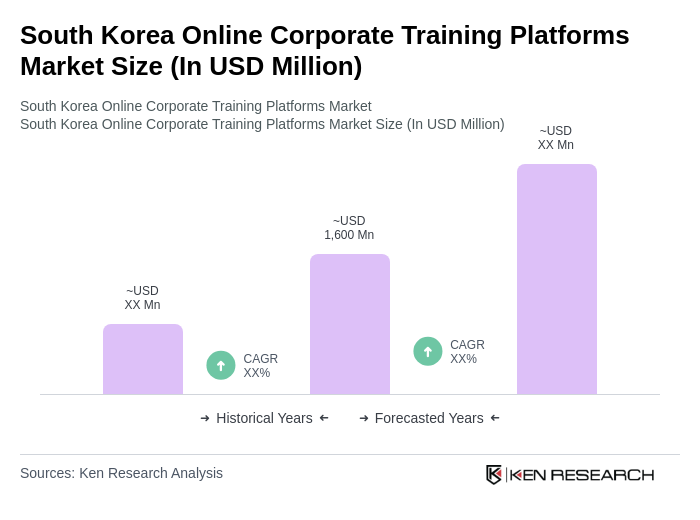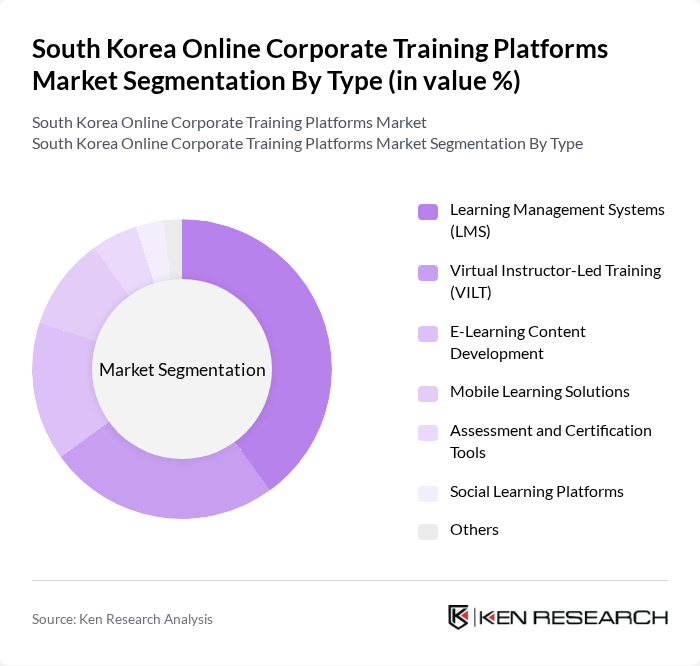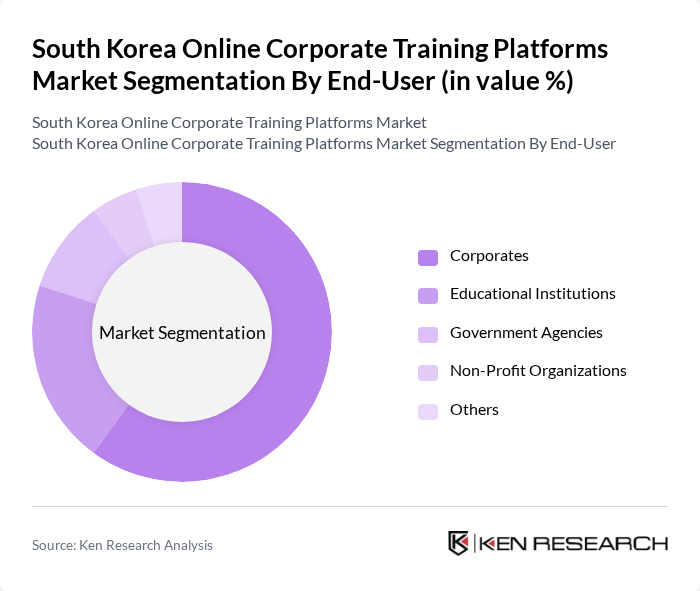Region:Asia
Author(s):Geetanshi
Product Code:KRAA3655
Pages:93
Published On:September 2025

By Type:The market is segmented into various types, including Learning Management Systems (LMS), Virtual Instructor-Led Training (VILT), E-Learning Content Development, Mobile Learning Solutions, Assessment and Certification Tools, Social Learning Platforms, and Others. Among these, Learning Management Systems (LMS) dominate the market due to their comprehensive features that facilitate tracking, reporting, and managing training programs effectively. The increasing need for organizations to streamline their training processes and enhance employee engagement drives the demand for LMS solutions.

By End-User:The end-user segmentation includes Corporates, Educational Institutions, Government Agencies, Non-Profit Organizations, and Others. Corporates are the leading end-users, driven by the need for continuous employee training and development to keep pace with industry changes. The increasing focus on upskilling and reskilling employees in various sectors, particularly IT and finance, has led to a significant rise in corporate training initiatives.

The South Korea Online Corporate Training Platforms Market is characterized by a dynamic mix of regional and international players. Leading participants such as Skillsoft, LinkedIn Learning, Coursera, Udemy for Business, Pluralsight, TalentLMS, Docebo, SAP Litmos, Moodle, EdApp, LearnUpon, Blackboard, 360Learning, Mindflash, Vado, Naver, Kakao contribute to innovation, geographic expansion, and service delivery in this space.
The future of the South Korean online corporate training market appears promising, driven by technological advancements and a growing recognition of the importance of employee development. As companies increasingly adopt digital solutions, the integration of AI and personalized learning experiences will likely become standard. Furthermore, the emphasis on soft skills training and mobile learning platforms will shape the landscape, ensuring that training remains relevant and effective in meeting the evolving needs of the workforce.
| Segment | Sub-Segments |
|---|---|
| By Type | Learning Management Systems (LMS) Virtual Instructor-Led Training (VILT) E-Learning Content Development Mobile Learning Solutions Assessment and Certification Tools Social Learning Platforms Others |
| By End-User | Corporates Educational Institutions Government Agencies Non-Profit Organizations Others |
| By Industry | IT and Software Manufacturing Healthcare Retail Finance and Banking Telecommunications Others |
| By Delivery Mode | Online Self-Paced Learning Blended Learning Live Virtual Training On-Demand Learning Others |
| By Pricing Model | Subscription-Based Pay-Per-Use Freemium One-Time Purchase Others |
| By Content Type | Soft Skills Training Technical Skills Training Compliance Training Leadership Development Others |
| By Certification Type | Professional Certifications Skill-Based Certifications Compliance Certifications Others |
| Scope Item/Segment | Sample Size | Target Respondent Profiles |
|---|---|---|
| Corporate Training Needs Assessment | 120 | HR Managers, Training Coordinators |
| Employee Engagement in Online Training | 120 | Corporate Employees, Team Leaders |
| Market Trends in E-learning Platforms | 100 | Training Providers, Educational Consultants |
| Impact of Digital Transformation on Training | 100 | IT Managers, Digital Transformation Officers |
| Evaluation of Training Effectiveness | 120 | Learning and Development Specialists, Business Analysts |
The South Korea Online Corporate Training Platforms Market is valued at approximately USD 1,600 million, reflecting significant growth driven by the increasing adoption of digital learning solutions and the rise in remote work and continuous professional development needs.